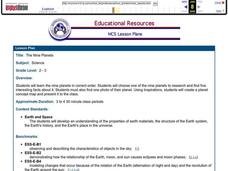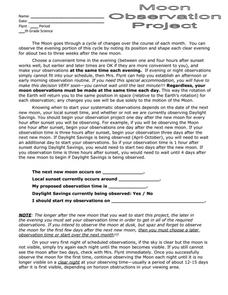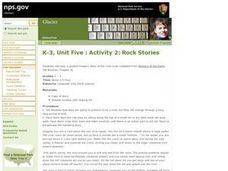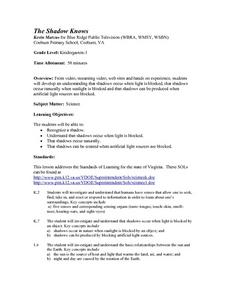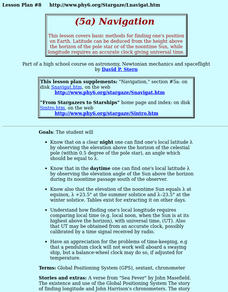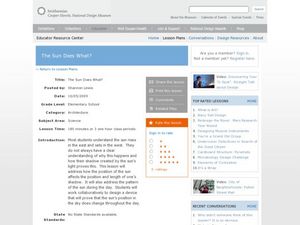Curated OER
Shadow Trackers: From Photography to Writing
Students explore the rotation of the earth. In this science instructional activity, students view photos of various places around the world. Students conduct an experiment in which they can see how the earth's rotation creates shadows on...
Curated OER
The Nine Planets
A solid instructional activity on teaching the nine planets in our solar system is here for you. In it, young scientists learn the correct order of the planets, and they choose one of the planets to do a research report on. They must...
K12 Reader
Convection Currents
After reading a brief article on the connection between convection currents and winds, kids use information in the text to respond to a series of comprehension questions.
School World
Moon Observation Project
Mrs. Flynt has designed a 12-day moon observation activity that is best assigned when daylight hours are shorter. Middle school moon experts record several factors, including the altitude above the horizon, the azimuth, the phase, and...
Curated OER
Space Science: Adventure is Waiting
These full-color handouts feature two activities. The first is a reading on comets, meteors, and meteoroids. Your space science learners will examine ten phrases and determine which of the three each characterizes. The second activity...
Curated OER
Rock Stories
Youngsters pretend they are rocks sitting on a hill. They listen to the provided guided imagery script to conceptualize the process of how rocks change over time. They draw a diagram of what happened to them as rocks during the story. An...
K5 Learning
Landforms
Valleys, mountains, and plateaus are just a few geographic landforms on our Earth. Read about these types and more in a brief landform passage. After reading, learners respond to six short answer comprehension questions.
Curated OER
My Antonia: Cubing Strategy
What is love? Why is it important? Explore this concept with an interactive activity that brings together Bloom's taxonomy and Willa Cather's My Antonia. After completing the novel, pupils toss a Bloom's cube and then answer the...
Curated OER
Observing Mars in the Night Sky
Students compare and contrast the orbits of Earth and Mars, locate the planet Mars, and diagram its retrograde motion.
Curated OER
Gianfranco Gorgoni
Students analyze creation of the Earth Art and examine differences between aesthetic work and work created for function. In this art analysis lesson, students analyze photographs from various projects for the art elements of line, shape,...
Curated OER
Deserts
What is it like in the desert? Inform your class on what makes a desert, the type of climate they'll find there, and the interesting plant and animals that live in the desert environment. This is a text-rich presentation that will...
University of Arizona
The Exotic Vacation
Students explain the concepts and vocabulary of Earth's rotation. They plan imaginary vacations based on the seasons in different locations. This is a very creative lesson plan, which students enjoy.
Curated OER
The Shadow Knows - Creating Shadows
Young learners recognize a shadow and witness how shadows occur when light is blocked. They access streamed video, standard video, and websites in order to engage in their study of how light is naturally blocked to create shadows. An...
Curated OER
Seasons of the Year
Young scholars examine how the link between the tilt of the Earth's axis to the ecliptic and seasons of the year--length of day, effectiveness of sunlight, polar day and night, and seasons south and north of the equator, as well as near it.
Curated OER
Navigation
Students study the basic methods for finding one's position on Earth. Latitude can be deduced from the height above the horizon of the pole star or of the noontime Sun, while longitude requires an accurate clock giving universal time.
Curated OER
Exploration of the Moon
In this moon activity, students will use a table with facts about the moon to answer questions about the moon's rotation, distance from the Earth, gravity, and temperature. Students will complete 9 short answer questions.
Curated OER
Lunar Lollipops
Students simulate the phases of the moon using a lamp and styrofoam balls. In this lunar phases lesson, students stand around a lamp and act as Earth. They hold styrofoam balls and rotate to show the phases of the moon.
Curated OER
The Sun and Moon
Students understand basic concepts about Earth, the Sun and the Moon,
such as relative movement and the phases of the moon. Through discussion, looking at pictures, listening to Native American stories, observing, and building models,...
Curated OER
The Sun Does What?
Students examine why the sun rises in the east and sets in the west. In this sun lesson, students explore the sunset and shadows. Students prove that the sun's position changes during the day. Students investigate what causes a shadow....
Curated OER
Our Changing View of the Solar System
Students identify and name the eight planets and the five dwarf planets in our solar system. In this space science lesson, students view a slideshow of the planets and label them on an included Solar System chart.
Curated OER
Phase to Phase with the Moon
Fourth graders study the Moon phases. The lesson includes hands-on activities as well as web-based activities. They use models of the Moon and a lamp to study each of the phases of the Moon, and test their knowlege of the Moon on a web...
Curated OER
Astronomy and Me: Moons Over New Haven
Third graders study the features of different moons orbiting the planets. In this astronomy lesson, 3rd graders explore the different phases of the moon using an interactive online website. They compare and contrast the features of the...




